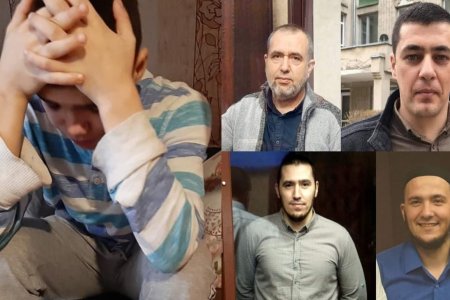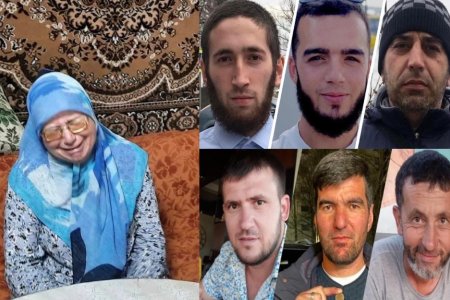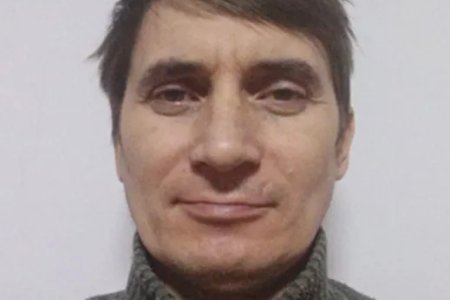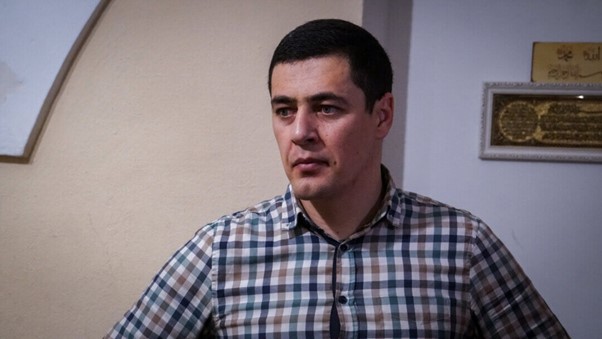
Representatives of at least five European countries have attended the first appeal hearing in Moscow against horrifically long sentences passed on four recognized Crimean Tatar political prisoners. Their presence was a clear statement regarding the fake ‘terrorism’ charges that Russia is using as a weapon of repression in occupied Crimea. It remains to be seen, however, whether it can help save the life of civic journalist Amet Suleimanov. He would be unlikely to survive the first days of the 12-year sentence he received, although his only ‘crime’ had been to help publicise Russian repression against other Crimean Tatars.
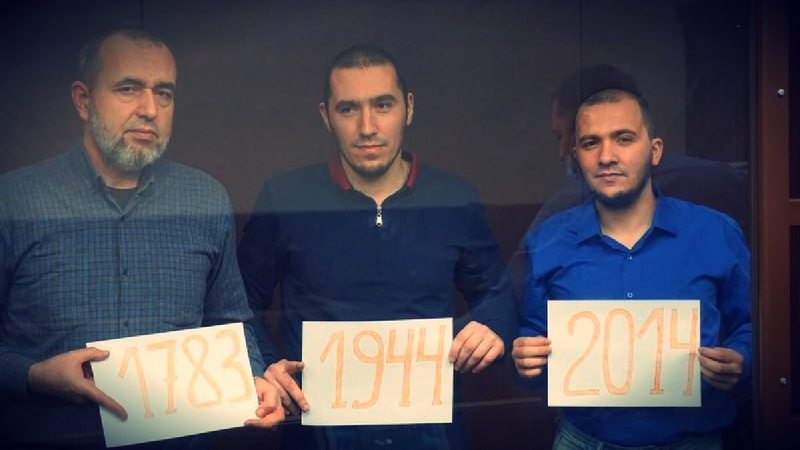
Russia is illegally applying its legislation in occupied Crimea and then ‘trying’ and imprisoning Ukrainian citizens in the worst of Russian penitentiary institutions, The appeal hearings that began on 1 February 2023 are against sentences passed by the notorious Southern District Military Court in Rostov (Russia) on 29 October 2021. As well as Amet Suleimanov, the Russian FSB targeted three members of one family: the two sons of a renowned Crimean Tatar historian and their maternal uncle. Seitumer Seitumerov was sentenced to 17 years’, his brother Osman Seitumerov to 14 years, on ‘terrorism’ charges based on planted ‘prohibited’ religious literature; conversations about religion and the ‘testimony’ of secret witnesses. In short, the same type of ‘evidence’ used 80 years earlier by Stalin’s regime to execute Seitumer and Osman’s great-grandfather for so-called ‘counter-revolutionary terrorist propaganda’. Their uncle, Rustem Seitmemetov received a 13-year sentence. In all cases, including with the 12-year sentence passed on Amet Suleimanov, the first three and a half years are to be served in a prison, the absolute worst of Russian penal institutions. All such sentences in the case of men who have committed no crime are shocking, but that against Suleimanov is especially cynical, as the three ‘judges’ who passed it (Igor Kostin (presiding judge); Roman Plisko and Yevgeny Zviagin) were well-aware that Suleimanov could probably not even survive the gruelling journey to the prison. Suleimanov suffers from chronic rheumatic heart disease, aortic insufficiency, coronary artery disease and third level mitral valve prolapse, and urgently needs a heart valve transplant. He had been forced to abandon his civic journalist work for the Crimean Solidarity human rights movement because of his mounting weakness, and, even according to Russian law, his medical conditions should directly preclude his imprisonment.
Suleimanov’s description to Graty of the events leading up to his arrest on 11 March 2020 provide a damning insight into the methods used by the Russian FSB to fabricate such prosecutions. Suleimanov’s heart problems are longstanding and life-threatening, and it is quite incredible that the FSB, in targeting him, appear to have only understood during his arrest that he would almost certainly die if placed in a SIZO, or remand prison.
He, on the contrary, had understood when the FSB made their first arrests of Crimean Muslims from Bakhchysara in May 2016i that the FSB would also target him. Virtually all of Russia’s political trials in occupied Crimea are based on the so-called ‘testimony’ of ‘secret witnesses’. In very many cases, these individuals, who reel off the allegations about the defendants almost verbatim from the indictment, but can often not answer the most basic questions about them, may not have ever set eyes on the men they are helping to imprison. In the case of political prisoners from Bakhchysarai, however, the situation is different, with essentially all of the prosecutions since May 2016 built around the ‘testimony’ of two ‘secret witnesses’ whose identity is known. Konstantin Tumarevich is a fugitive from justice in his native Latvia and was in a very vulnerable legal position in occupied Crimea without proper documents. The other person, recognized by several of the political prisoners, as Narzulayev Salakhutdin, was also without papers and did not want to be forcibly returned to Uzbekistan. In none of these trials, has proof ever been provided that the men had anything to fear from the defendants or their families if they testified openly, whereas it was quite clear what kind of levers of influence the FSB had on them.
Although all of the defendants in these prosecutions face ‘terrorism’ charges and huge sentences, these are based solely on unproven allegations that the men are members of the peaceful, transnational Hizb ut-Tahrir organization which is legal in Ukraine and most countries. Despite the fact that Hizb ut-Tahrir members are not known to have committed any acts of terrorism, Russia is using a secretive 2003 Russian Supreme Court ruling of dubious motivation which labelled Hizb ut-Tahrir ‘terrorist’ to imprison Crimean Tatar and other Ukrainian Muslims for up to 20 years without any crime. The cynicism of such ‘terrorism’ charges is particularly visible in the prosecutions of men from Bakhchysarai since the FSB are essentially using secret witnesses who ‘testify’ to meetings back in 2015 or 2016 as ‘proof’ of involvement in Hizb ut-Tahrir. The FSB are known to use their prosecutions both as a weapon against civic activists and journalists and as a banal tool for producing ‘good statistics’ on ‘fighting terrorism’. For bonuses and / or promotion, it does not appear to matter that they prevent conversations or alleged ‘recruitment’ as supposed ‘proof of terrorism’ [i.e. involvement in Hizb ut-Tahrir] after sitting on this ‘evidence’ for as much as six or seven years.
Amet Suleimanov says that he understood that he would be targeted, when Enver Mamutov and three other Crimean Tatars were arrested on 12 May 2016, and it became clear that their prosecution was based on the so-called testimony of Tumarevich. Suleimanov had once been friendly with Tumarevich, not knowing that the man, who had pretended to convert to Islam, was in fact collaborating with the FSB.
Tumarevich played a major role in providing the prosecution ‘testimony’ against Mamutov, and against the civic activists and journalists from Bakhchysarai arrested in October 2017 and May 2018. These were all close friends and / or colleagues, and Suleimanov felt compelled to also join Crimean Solidarity “to somehow explain to the public that ordinary people are being imprisoned for nothing”. Even without Tumarevich and the close contacts he had with political prisoners, arrested earlier, Suleimanov’s civic journalism (streaming information about armed searches, political hearings, etc. onto the Internet) would have made him an obvious target for the FSB.
He certainly became such a target and was under over surveillance for some time before the armed raid and arrest on 11 March 2020. Although Suleimanov’s physical condition had forced him to give up his civic journalism fairly, soon and the FSB must have known of this, they appear to have believed that they could secure his imprisonment. Several Ukrainian political prisoners have medical conditions which should have prevented their detention and have not, but this time, Suleimanov’s evident physical distress and the nature of his medication probably led the FSB to fear that he would die “on their patch” with questions then asked as to why they ignored the huge weight of medical evidence. For the first time in these cases, after just one night in the SIZO, the FSB asked for house arrest, rather than detention. Even this has taken a huge toll on Suleimanov’s health and prevented life-saving medical treatment.
If the Russian court of appeal during the hearings scheduled for 6-7 February upholds the barbaric 12-year-sentence, Amet Suleimanov will be taken into custody immediately. This really would be a death sentence for his civic journalism and for his faith.
